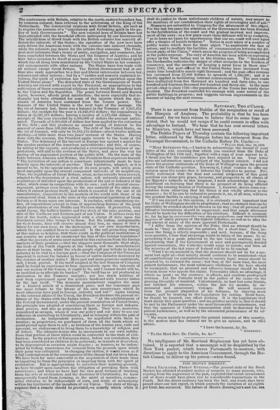SATURDAY, Two O'CLOCK. There is no account from Dublin of
the resignation or recall of the Marquis of Anglesey. The probability is that he has been dismissed ; for we have reason to believe that he Some time ago stated, that he would not resign if he could remain in office with advantage to Ireland. We hear that he has sent several letters to Ministers, which have not been answered.
The Dublin Papers of Thursday contain the following important letter, addressed by the Marquis before his retirement from the Viceregal Government, to the Catholic Bishop Dr. Curtis :- " Phatnix Park, Dec. 23, 1828. "MOST REVEREND SIR,—I hasten to acknowledge the receipt of your letter of the 22d, covering that which you received from the Duke of Wellington of the 11th inst., together with a copy of your answer to it. I thank you for the confidence you have reposed in me. Your letter gives me information upon a subject of the highest interest. I did not know the precise sentiments of the Duke of Wellington upon the present state of the Catholic question. Knowing it, I shall venture to offer my opinion upon the couuse that it behoves the Catholics to pursue. Per- fectly convinced that the final and cordial settkement of this great question can alone give peace, harmony, and prosperity to all classes of his Majesty's subjects in this kingdom, I must acknowledge my disap- poinfinent on learning that there is no prospect of its being effected during the ensuing Session of Parliament. 1, however, derive some con- solation from observing that his Grace is not wholly adverse to the measure ; for if he can be induced to promote it, he, of all men, will have the greatest facility in carrying it into effect.
"if I am correct in this opinion, it-is obviously most important that
the Duke of Wellington should be propitiated ; that no obstacle that can by possibility be avoided should be thrown in his way ; that all personal and offensive insinuations should be suppressed; and that ample allowance should be made for the difficulties of his situation. Difficult it certainly is; for he has to ovP.rcorto; the =try ..trOrle pr6Ild ,i-mmt tire-turn esLea motive, of many persons of the highest influence, as well as to allay the real alarms of many of the more ignorant Protestants.
" I differ from the opinion of the Duke, that an attempt should be made to ' bury in oblivion' the qtrestion for a short time. First, be- cause the thing is utterly impossible ; and next, because, if the thing were possible, I fear that advantage might be taken of the pause, by re- presenting it as a panic achieved by the late violent reaction, and by proclaiming that it' the Government at once and peremptorily decided against concession, the Catholics would cease to agitate, and then all the miseries of the last years of Ireland will be to be reacted.
"What I do recommend is, that the measure should not be for a mo- ment lost sight of—that anxiety should continue to be manifested—that all constitutional (in contradistinction to merely legal) means should be resorted to, to forward the cause '; but that, at the same time, the most patient forbearance, the most submissive obedience to the laws should be inculcated ; that no personal and offensive language should be held
towards those who oppose the claims. Personality offers no advantage, it effects no good ; on the contrary, it offends, and confirms predisposed aversion. Let the Catholic trust to the justice of his cause—to the growing liberality of mankind. Unfortunately, he hast lost some friends, and fortified his enemies, within the last six months, by un- measured and unnecessary violence. He will soonest recover from the present stagnation of his fortunes, by showing more temper, and by trusting to the Legislature for redress. Brute force, he should be assured, can effect nothing. It is the Legislature that must decide this great question ; and my greatest anxiety is, that it should be met by the Parliament under the most favourable circumstances, and that the opposers of Catholic emancipation shall be disarmed by the patient forbearance, as well as by the unwearied perseverance of its ad- vocates.
"My warm anxiety to promote the general interests of this country, is the motive that has induced me to give an opinion, and to offer advice.
"I have the honour, &c. &c.
"ANGLESEY.
"To the Most Rev. Dr. Curtis, &c. &c."
No intelligence of Mr. Rowland Stephenson has yet been ob- tained. It is reported that a messenger will be despatched by the New York packet, which leaves Portsmouth to-morrow, with directions to apply to the American Government, through the Bri- tish Consul, to deliver up his person—when found.





















 Previous page
Previous page